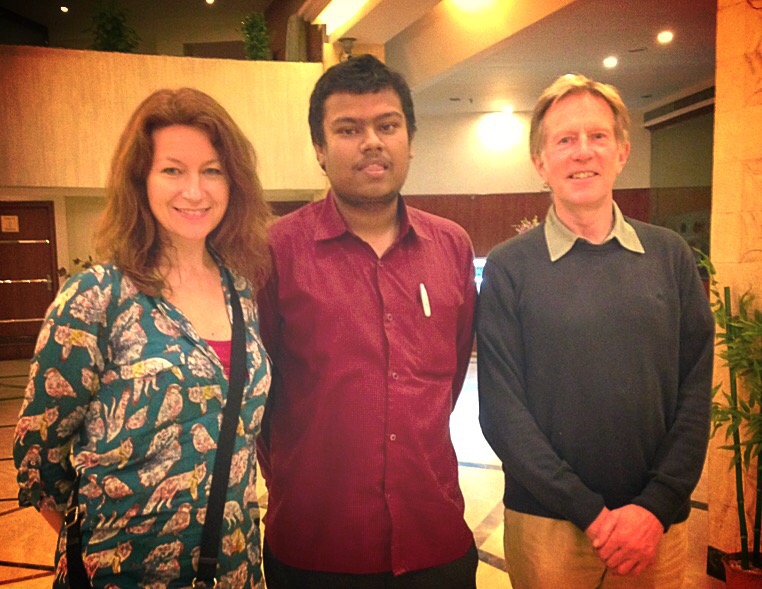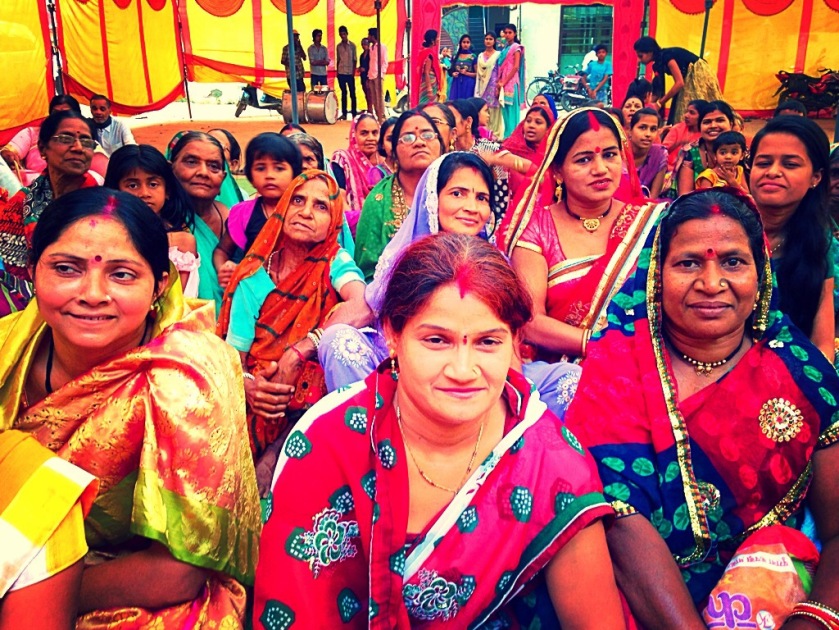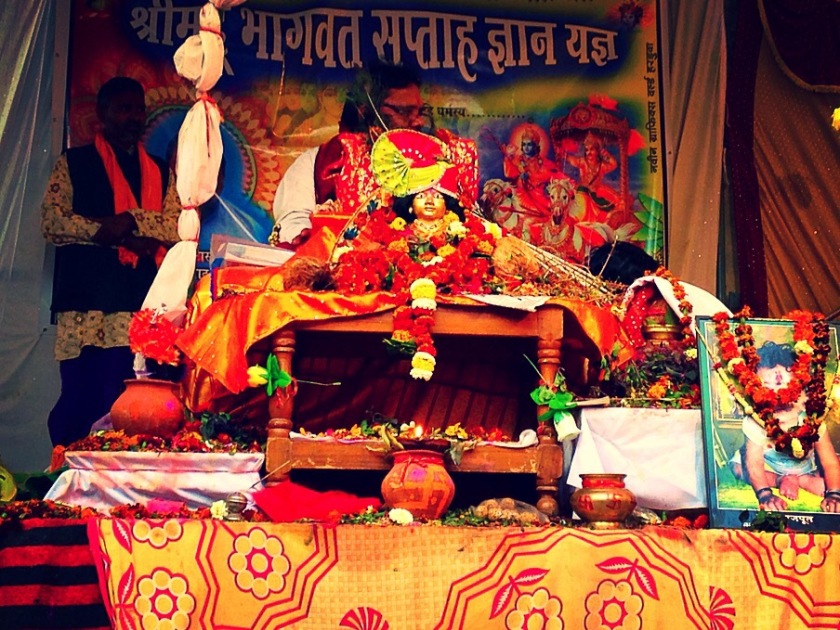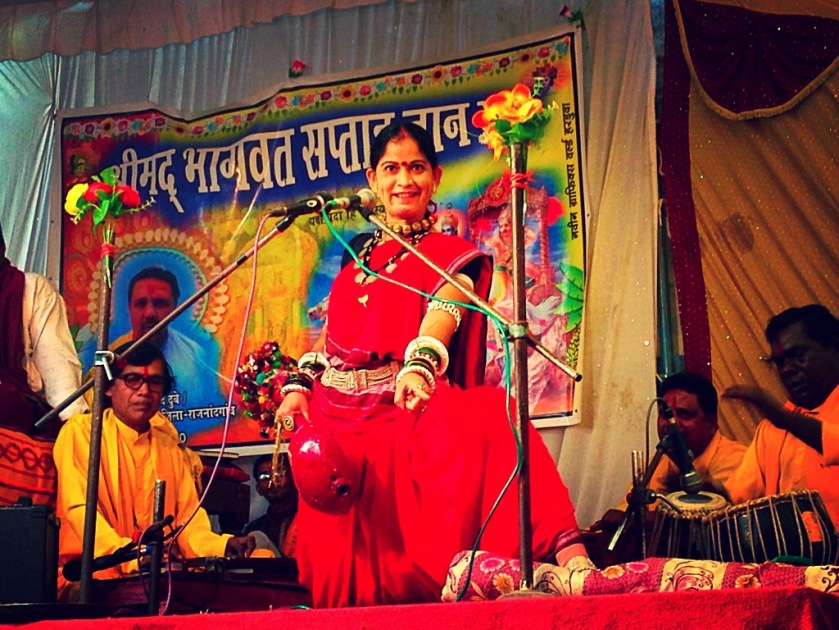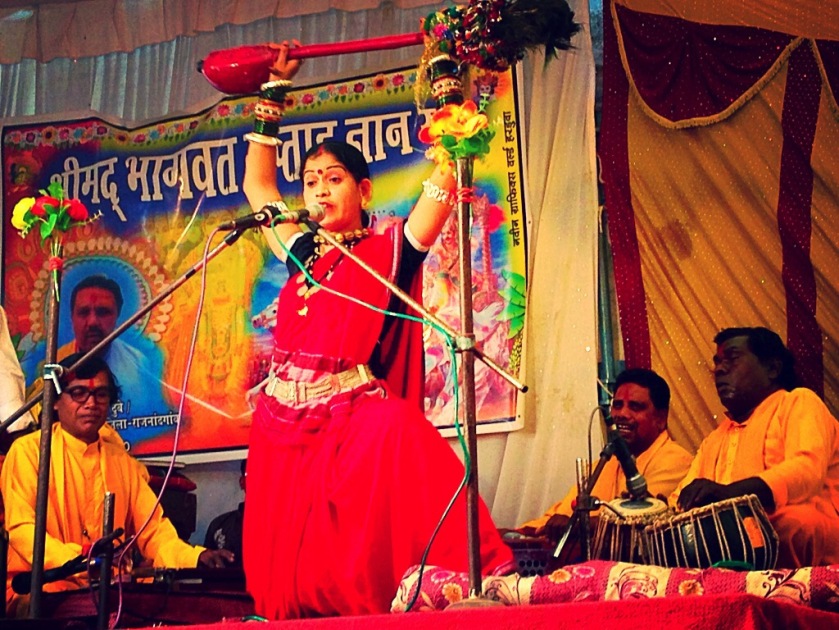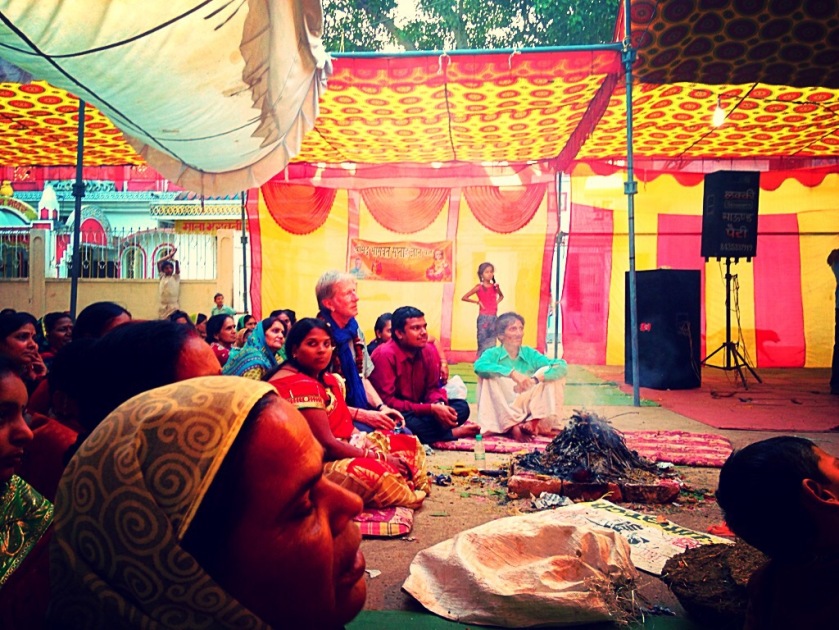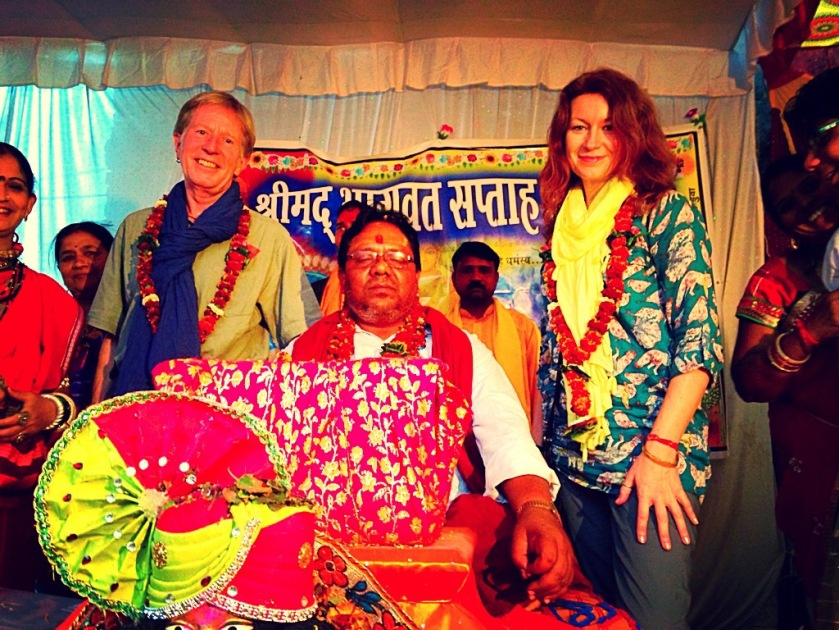I’m starting this blog entry as David and I begin our long journey home to Wales. This India odyssey has moved on apace, with yet more acid-bright colours and subtle textures added to its weft and weave, but now to pick up the threads of our day with Ritu Verna in Chhattisgar, and continue where we left off.
Thursday is the day allocated in the Hindu week to honour departed Gurus, the clue is in the very name given to this day, Guruvar. It’s election time here in India right now, with many of the areas holding local and regional elections, and the towns and cityscapes are awash with rainbow coloured election posters, that bear poorly photoshopped images of each of the candidates and what I imagine is an outline of their election promises. These along with adverts of education colleges, institutions and courses dominate the advertising billboards and find their way onto every spare patch of wall and signboard from bazar to bus station, five star hotel to shanty town.
On the day we met Ritu, it was Chhattisgar’s turn, which caused a problem. Ritu wanted to perform for us, she wanted to present an extract from the Pandavani, and we were more than delighted to accept that offer. We would ‘sponsor’ the event, which sounds extravagant for those of us used to theatre prices at home, but here in India, things are different, and for the cost of a branded coffee and a cake in the UK, six traditional performers can come together to put on a short performance in the equivalent of a local village hall. The problem was that all the village halls and associated performance equipment such as microphones and PA systems, had been commandeered for the electioneering. Nevertheless, Ritu’s husband, Mandesh, knew that a community in nearby Durg were getting together to honour Guru Saii Baba, and managed to arrange for Ritu and the group to have use of the stage immediately after the ceremony.
At five o clock, with Pandavani musicians gathered and now clad in bright yellow silks, and Ritu transformed into a vision of red, tribal womanhood, with a coil of delicate green and red glass bracelets set between thick, chunky silver tribal bracelets along both her forearms, we left in a fleet of cars for Durg, only a short, dusty drive away.
The ceremony honouring Saii Baba was drawing to a close when we arrived, though there were still some women at the shrine making their offerings. The priest or ‘Pundit’ as they are known (yes, another Hindi word appropriated by the English language) was still presiding, sitting cross legged above and behind the makeshift shrine. Women at the front fed a fragrant fire with dry dung of some kind and threw herbs and incense onto it, so that the smouldering pyre gave off a rich mixture of earthy and sweet, perfumed smoke.
We were warmly welcomed. One among the ladies had a little English and she drew us forward to sit in plastic patio chairs at the side of the stage while the Padavani troupe set up their instruments. We didn’t stay sitting for long. Once the offerings to Saii Baba were complete, those assembled turned their attention to us and the shaking of hands, the exchange of ‘Namaste’, the requests for photos with wives and children, cousins, uncles, aunts and neighbours began. It is delightful this enthusiasm, this wonder and welcome, but also somewhat overwhelming for western sensibilities. Cameras are trained upon you and follow your every move, snapping away. Of course, we took some too, and the images will be a part of the record of this journey, I’m just curious as to what the hundreds of photos they took of us will mean to them in a week, a month or a year’s time?
Eventually I was drawn by a group of gloriously saried women to sit among them, at the front. We sat cross legged on mats and I learned the Hindu word for wonderful ‘sundar’ which I repeated time and time again, touching the silks and synthetics of their saris, making them smile coyly, accepting the complement. I turned around to look behind me, it was a sea of bejewelled saris all the way to the end of the seating mats – an extraordinary sight, one I think I will never forget, and utterly ‘sundar’.
The lady in charge came towards us with a dish containing some thick, creamy liquid and a small spoon. I thought we were about to be pujad again, but she ladled a little into our hand. ‘Drink’ she said, ‘it is a blessing’. Travellers in India have long learned that regular hand washing, particularly before eating or putting your hands near to your mouth is a vital part of avoiding upset tummies caused by the thousands of unfamiliar bacteria we encounter here, and to which we have no natural resistance. That and avoiding drinking or consuming anything prepared with local tap water. There was just enough time to regret not having had the chance to wash our hands after so much hand shaking, photo taking, sari touching, mat sitting, and to reflect that the water used to make this cold potion, was probably not of the mineral, bottled kind. There was also no way out. There was no question of refusing to drink this liquid, it would have been a great insult, so down it went.
With that, Ritu took to the stage, or rather took the stage. This petite, quietly spoken lady had transformed. Her presence filled the canopied space and probably resonated beyond. She was powerful, heroic, indomitable. The music began, and we were off, following Arjun on his adventures.
The Pandavani form has a very clear, definded and repeated pattern of text as the singer regales the story, it then moves to music and song and eventually tipping into what seems like a calamity of music, a free for all, and yet it has form, and melody and rhythm, before fading to a few passages of ordered melody from which the dialogue springs up once more. And it is a dialogue. Ritu, while addressing the audience, was nevertheless in a conversation of sorts with the group’s ‘ragi’ (Udairam), who’s role is to punctuate, comment, add comic effect and sometimes ask questions to draw out further meaning from the singer’s retelling. Much was punctuated with “whe, whe!” And “yeah, yeah”. Ritu’s stances during this section of the retelling were heroic and warrior-like, and bore more than a fleeting likeness to the energy of those equivalent yoga postures. These elements: the music, the singer’s stances, the ragi’s contributions, the singer’s mention of names and her actions mean that much communicates without the need to understand the language. As long as you have a very basic knowledge of the story’s narrative, then the performance is easily followed.
It was over all too soon. After more photos and hand shaking, we were back in our cars and returning to Ritu’s village. By now it was getting late, and so after some short discussions around festival dated and visa arrangements, we bid the Padavani’s farewell and headed back to the hotel, dropping our lovely translator Andulav near his home on the way.
My stomach was complaining. Something in the past 24 hours was not going down well and so supper at the hotel became a cup of hot chai massala. David and I were just looking through our pictures of the day when a call came through from Andulav. “My father wants a picture of us together, we’re coming over to the hotel.” And so it was that we met Andulav’s proud dad who had been in college with our tour operator, Mr Singh, and our day ended with the taking of more photographs, more shaking of hands, and yet more fond farewells.
